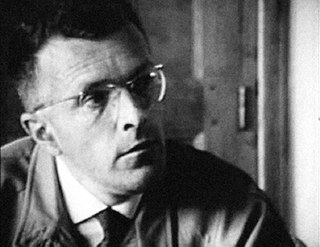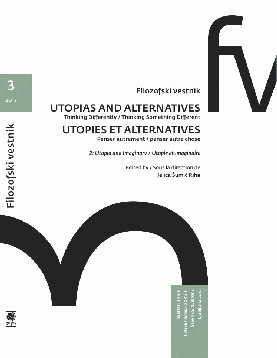Critique is a method of disciplined, systematic study of a written or oral discourse. Although critique is commonly understood as fault finding and negative judgment, it can also involve merit recognition, and in the philosophical tradition it also means a methodical practice of doubt. The contemporary sense of critique has been largely influenced by the Enlightenment critique of prejudice and authority, which championed the emancipation and autonomy from religious and political authorities.

Other is a term used to define another person or people as separate from oneself. In phenomenology, the terms the Other and the Constitutive Other distinguish other people from the Self, as a cumulative, constituting factor in the self-image of a person; as acknowledgement of being real; hence, the Other is dissimilar to and the opposite of the Self, of Us, and of the Same. The Constitutive Other is the relation between the personality and the person (body) of a human being; the relation of essential and superficial characteristics of personal identity that corresponds to the relationship between opposite, but correlative, characteristics of the Self, because the difference is inner-difference, within the Self.

Gilbert Simondon was a French philosopher best known for his theory of individuation and his work on the field of philosophy of technology. Simondon's work is characterized by his philosophical approach on information theory, communication studies, technology and the natural sciences. Although largely overlooked in his lifetime, the advent of the information age has collaborated to a reappraisal and increased interest in Simondon's books, with him being seen as someone who has precisely predicted and described the social effects and paradigms technical objects and technology itself have offered in the 21st century.

Krisis is an anti-political German political magazine and discussion group formed in 1986 as a "theoretical forum for a radical critique of capitalist society." Its members includes Robert Kurz, Roswitha Scholz, Nobert Trenkle, Ernst Lohoff, Achim Bellgart and Franz Schandl.

The Oxford Dictionary of Byzantium (ODB) is a three-volume historical dictionary published by the English Oxford University Press. With more than 5,000 entries, it contains comprehensive information in English on topics relating to the Byzantine Empire. It was edited by Alexander Kazhdan, and was first published in 1991. Kazhdan was a professor at Princeton University who became a Senior Research Associate at Dumbarton Oaks, Washington, DC, before his death. He contributed to many of the articles in the Dictionary and always signed his initials A.K. at the end of the article to indicate his contribution.
Articles in social and political philosophy include:
Thomas McCarthy is John Shaffer Professor of Philosophy Emeritus at Northwestern University. Before joining Northwestern in 1985, he taught for four years at Munich University and for thirteen years at Boston University. After retiring from Northwestern in 2006, he served for three years as William H. Orrick Visiting Professor at Yale University. Over the course of his academic career, McCarthy's work was supported by grants and fellowships from the National Endowment for the Humanities, the Alexander von Humboldt Foundation, the American Council of Learned Societies, and the Guggenheim Foundation. Early in his career he wrote and taught principally in the philosophy of logic and mathematics and then in the philosophy of the social sciences. Subsequently, and for the bulk of his career, he worked in the general area of critical, social and political theory, and in particular on the work of Jürgen Habermas, of which he is widely regarded as one of the foremost English-language interpreters. During his last decade of teaching, McCarthy focused on theoretical issues in the history of racist and imperialist thought, and particularly on their interweaving in theories of progress and development.

Albrecht Wellmer was a German philosopher at the Freie Universität Berlin.
This is the alphabetical index of philosophy. This page contains three main topics: core subjects, philosophy-related articles and philosophers.
Alessandro Ferrara is an Italian philosopher, professor of political philosophy at the University of Rome Tor Vergata and former president of the Italian Association for Political Philosophy. He currently teaches legal theory at Luiss Guido Carli University in Rome and political theory at Loyola University Chicago.
Bjørn Thomassen is an anthropologist and social scientist. He is associate professor at Roskilde University in the Department of Society and Globalisation. From 2003-2012 he worked at The American University of Rome, where he was chair of the department of International Relations.

Robert Kurz was a German philosopher, social critic, journalist and editor of the journal Exit! He was one of Germany's most prominent theorists of value criticism.
Manifesto Against Work is a manifesto critical of work written by the authors who were active in the journal Krisis a group that had the German philosopher Robert Kurz as one of its main contributors. The Manifesto Against Work emerged during the time in which the New Labour ideology spread across Europe in the late 1990s.

A critical theory is any approach to humanities and social philosophy that focuses on society and culture to attempt to reveal, critique, and challenge power structures. With roots in sociology and literary criticism, it argues that social problems stem more from social structures and cultural assumptions rather than from individuals. Some hold it to be an ideology, others argue that ideology is the principal obstacle to human liberation. Critical theory finds applications in various fields of study, including psychoanalysis, film theory, literary theory, cultural studies, history, communication theory, philosophy, and feminist theory.

Filozofski vestnik is a philosophy journal published by the Institute of Philosophy of the Slovenian Academy of Sciences and Arts. It covers issues like contemporary political philosophy, history of philosophy, history of political thought, philosophy of law, social philosophy, epistemology, philosophy of science, cultural critique, ethics, and aesthetics. It is not committed to a particular philosophical orientation, style or school. The journal was established in 1980. It was issued semi-annual from 1980 to 1995, three issues per year appeared since 1996. Articles are written in Slovene, English, French, and German. Rado Riha was the journal's editor-in-chief from 1996 to 2003.

Gan Yang is a Chinese political philosopher, "Confucian socialist". He is dean of the Liberal Arts College at Sun Yat-sen University, and was formerly professor of political philosophy at the Chinese University of Hong Kong.
Chiara Bottici is an Italian philosopher, critical theorist and historian of philosophy.
Marxist cultural analysis is a form of cultural analysis and anti-capitalist cultural critique, which assumes the theory of cultural hegemony and from this specifically targets those aspects of culture which are profit driven and mass-produced under capitalism.








